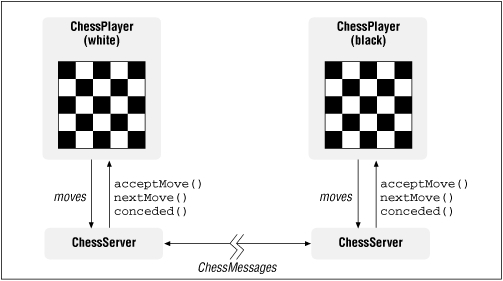Fixed Protocols
If we recall our definition of a message as an identifier followed by a set of arguments, we can break down the possible message protocols into fixed and adaptable types. In this section we’ll discuss fixed protocols, where the set of possible identifiers and the arguments for each type of message are known beforehand and don’t change during a communication session. Adaptable protocols have variable argument lists on messages, or variable sets of message types, or both.
Let’s return to the
chess-player agents that we mentioned
earlier and define a fixed protocol that they could use to engage in
a game of chess. We’ll define a protocol that will let them
pass moves back and forth, confirm each other’s moves, and
concede a game. Then we’ll implement this message protocol
using our BasicMessage and
BasicMsgHandler classes.
Figure 6.1 shows the architecture of the
chess-playing system we’ll be building in the following
sections. On each player’s host computer, a
ChessPlayer
object keeps track of the current
board layout and comes up with the player’s next move. A
ChessServer
object handles all of the
communication with the remote opponent; it packages up moves from the
local player into messages, and ships them off to the
opponent’s ChessServer. (It also takes
messages from the remote opponent and calls the required methods on
the local ChessPlayer.)
 |
Get Java Distributed Computing now with the O’Reilly learning platform.
O’Reilly members experience books, live events, courses curated by job role, and more from O’Reilly and nearly 200 top publishers.

